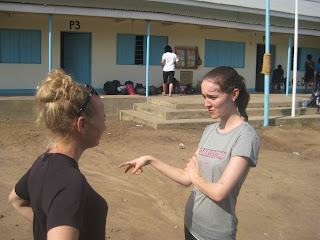After a hot morning at the S.t Joseph Nansana Catholic
School, a primary school in the suburbs of Kampala, followed by a site tour of
an education- and health-focused NGO based in Nansana, called “Nurture Africa”,
exhaustion overruled our group’s ability and willingness to actively engage in
discussion. Even the vanilla ice cream
bought at our roadside stop that reminded many Hopkins students of Betty
Crocker Vanilla Frosting, and was deliciously cold hadn’t helped much.
While our trio’s focus for the trip was on education, we had
planned for a rather academic reflection session with our peers. Looking at the tired faces, and back at each
other, we knew we’d pull this through.
While in Uganda, we had predominantly focused on the
disparities between public and private schools, at both the primary and
secondary levels. Specifically, we had
looked at the effects of Universal Primary Education (UPE) and Universal
Secondary Education (USE), policies with the goal of providing free primary and
secondary education to children in Uganda.
Furthermore, our time in Uganda had coincided with the release of PLE
results, the marks on the national Primary Leaving Examination, that likely
cemented the fate of many young minds.
The exams and results had served as a great backdrop to our lively
discussions that settled around the inequity between public and private
schools, and had highlighted educational patterns similar not across Uganda and
in the US, but maybe across the World.
While entertaining these similarities, we had begun forming a draft for
our reflection.
When planning four our reflection session, and throughout
the trip, the diversity of our trio played an essential role in steering
conversation. Amongst the three of us,
we had attended both public and private schools in a total of six different
countries: Switzerland, Germany, Uganda, Ivory Coast, and the USA. Through our own experiences, our group
discussions, and our experiences during structured activities in Uganda, we
realized just how much we had in common, and what a large role misconceptions,
especially in regards to education could have.
With this in mind, we began our reflection session.
While the fatigue was still visible in our peer’s faces
while we questioned them about their academic past, we did find out some
interesting facts about our group:
- Most JHU students attended public secondary schools; most
Makerere students attended private secondary schools.
- JHU students generally defined their scholastic experience
by social experiences, Makerere students by academic rigor.
- For most students, at least one parent had previously
attended university. (The three students whose parents both had not attended
university were all from Hopkins)
- When inquiring about student’s perception of their secondary
education system’s fairness (predominantly in regards to gender), we got mixed,
but overall relatively positive answers from both Makerere and Hopkins students.
- The majority of students, Makerere and Hopkins alike, perceived
their secondary education as extremely helpful and beneficial in their
development. (Three students felt that their social experiences and
environments, especially at the university level, were more impactful in their
development)
- While parental involvement varied from person to person
regardless of origin, all students acknowledged that parental value of
education is a critical factor in educational achievement.
- Given enough money and the choice of sending their
children to either a public or private school of similar academic reputation, most
students, from both universities, would send their child to the same type of
secondary school they attended (ie. If they attended private school, they would
send their child to private school and vice versa)
To conclude our reflection session, we handed out pieces of
paper with two questions:
1) Public school students: How would you describe a private
school?
Private school
students: How would you describe a public school?
2) If you could only send one of your children to school,
would you send your son or your daughter?
While public school students (predominantly American)
described public schools as “snotty”, “prestige”, “elitist”, “having better
teachers and academics”, “affluent” and “sheltered”, their public school attending
counterparts (mostly Ugandan) described private schools as “congested”,
“underequipped”, “”having limited options”, “full of inequality”, and
“diverse”. As discussed as a group after
reading out the results, we realized that both public and private students had
a largely negative opinion about the opposite type of school.
While our discussion was cut short by our speaker, a head
teacher from Kampala entering the room for our talk, our trio was pleasantly
surprised to note that, when faced with the choice of only sending one, the
majority (63%) of our group would send their daughter, rather than their son to
school. This ended our day on a rather
optimistic note, especially after weeks of reading and hearing about the high
drop-our rate of girls in Uganda.
















































